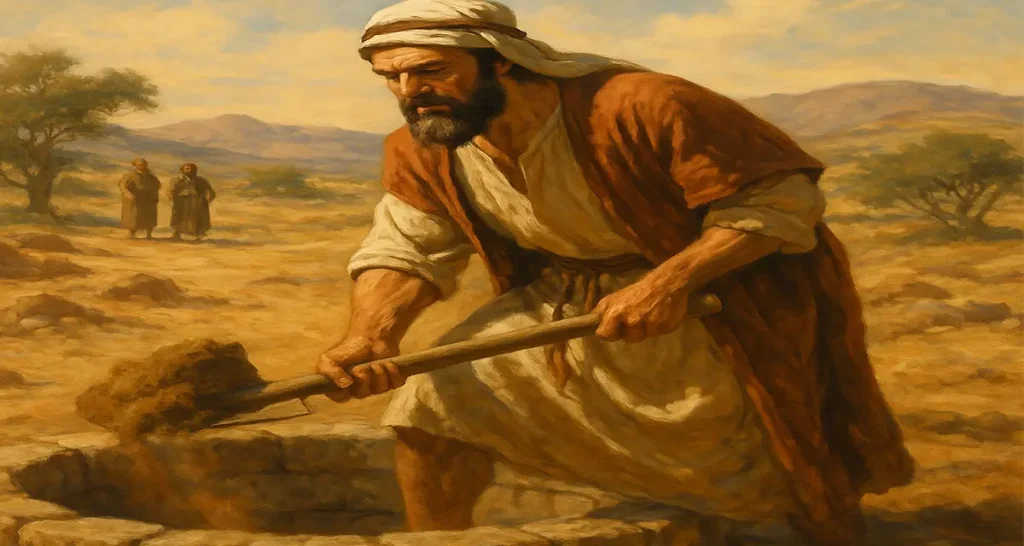Yes. You’ve touched on the core of human frailty—and the mystery of divine strength.
You’re absolutely right: The repeated cycle of digging, disputing, being pushed out, starting again is not sustainable by sheer human grit. It’s physically draining. It’s emotionally crushing. It’s psychologically unsustainable. No one, not even the greats of Scripture, could bear this alone.
So you’re right to say: Something else must be going on.
Let’s explore what that “something else” is.
💔 1. Frustration Is Real—Even for the Faithful
Let’s not sanitize Scripture.
- Elijah: “I have had enough, Lord… take my life.” (1 Kings 19:4) — after just one victorious moment on Mount Carmel, he was crushed by fear and despair.
- Moses: “If this is how you are going to treat me, please go ahead and kill me.” (Numbers 11:15)
- Jeremiah: “Cursed be the day I was born!” (Jeremiah 20:14)
- Paul: “We were under great pressure, far beyond our ability to endure.” (2 Corinthians 1:8)
These men were spiritual giants—yet they hit the wall. So if we feel tired in the pattern of “digging, losing, digging again,” we’re not faithless. We’re human.
🕊️ 2. The Sustaining Force Is Not Willpower—It’s God’s Presence
Isaac only hears God’s voice at the end of his struggle in Genesis 26:
“Do not be afraid, for I am with you.” (v. 24)
That was the sustaining truth all along, even though he didn’t hear it out loud until then.
The unseen presence of God was the fuel that kept him going—not inner strength. Like oxygen: invisible, but vital.
In the New Testament, Paul doesn’t say “I figured it out” or “I became strong.”
He says:
“Not I, but Christ in me.” (Galatians 2:20)
“His strength is made perfect in my weakness.” (2 Corinthians 12:9)
⚠️ Without that inner work of God—His Spirit upholding, strengthening, interceding within us—we would give up before Rehoboth.
💡 3. There Is Grace for the Middle, Not Just for the End
Sometimes we think grace is only at the finish line. But grace is for:
- The 3rd well that got taken again.
- The 4th morning of starting over.
- The prayer when nothing changes.
- The tent where no one else understands the weariness.
Grace is daily manna, not just a feast at the end.
Jesus said:
“Each day has enough trouble of its own.” (Matthew 6:34)
But also:
“My grace is sufficient for you.” (2 Corinthians 12:9)
🔁 4. Faithfulness Is Not Always Victory—Sometimes It’s Just Not Quitting
There is something profoundly holy in simply staying the course when everything in you wants to stop.
Hebrews 12 says:
“Let us run with endurance the race set before us, fixing our eyes on Jesus…”
Why Jesus?
Because:
“For the joy set before Him, He endured the cross, scorning its shame…”
He endured not because the process felt good—but because of the joy beyond it.
Faithfulness looks like digging one more time, not because the well is guaranteed to be yours, but because you trust the One who said, “I am with you.”
🕯️ 5. There Is a Power Working in You Greater Than You
Isaac didn’t make it because he was resilient.
He made it because God had made a covenant with him, and God is faithful to His covenant.
In Christ, we have that same promise:
“He who began a good work in you will carry it on to completion.” (Philippians 1:6)
You’re not digging alone. You’re not fighting alone. Even your strength to keep going is not your own—it’s been given.
🌿 Final Word: When Digging Becomes Worship
Isaac built an altar before the next well. That’s the secret.
He wasn’t driven by success—he was grounded in presence.
Sometimes your next breakthrough won’t come from digging harder, but from kneeling deeper.
Because worship says:
“Even if the next well is taken too, I will not stop trusting. Because You are with me.”


